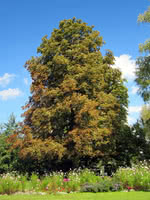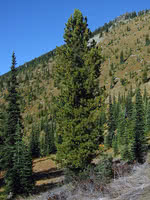Mon-Fri 9am - 5pm Mountain time
Horse Chestnut vs Whitebark Pine
Aesculus hippocastanum
Pinus albicaulis
CUSTOM GROW
Horse Chestnut is a medium sized deciduous tree that is native to Greece but has been grown in North America for hundreds of years. It produces large nuts.
Endangered
Whitebark Pine is a beautiful coniferous tree that produces tasty, edible nuts. You'll love this trees' rustic and natural appeal, making it an excellent specimen tree.
It is an endangered species from the Rocky Mountains, this slow grower seldom produces cones until it is 50 years old but regularly survives to be 500 or more years of age. Our staff think it is among the most attractive pines we have grown.
Whitebark Pine is well-known for maintaining snow drifts, providing food and shelter to many species of wildlife, and bringing stability to steep slopes. This high elevation and adaptable tree is deer resistant and can withstand a variety of soils and moisture levels.
Horse Chestnut Quick Facts
Whitebark Pine Quick Facts
Toxicity: most parts of plant are toxic

